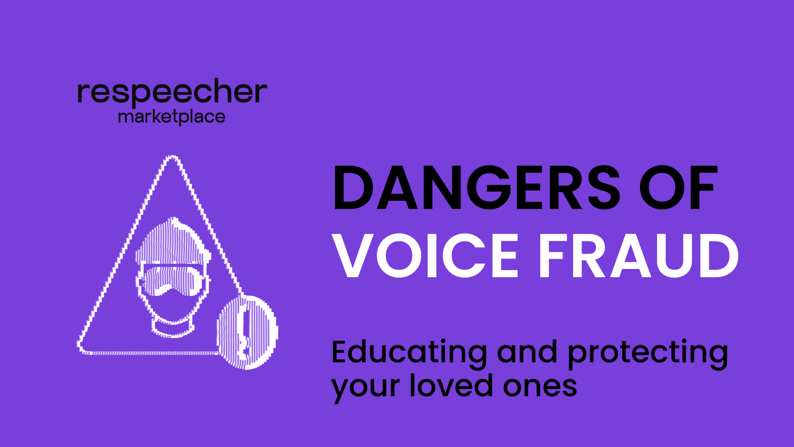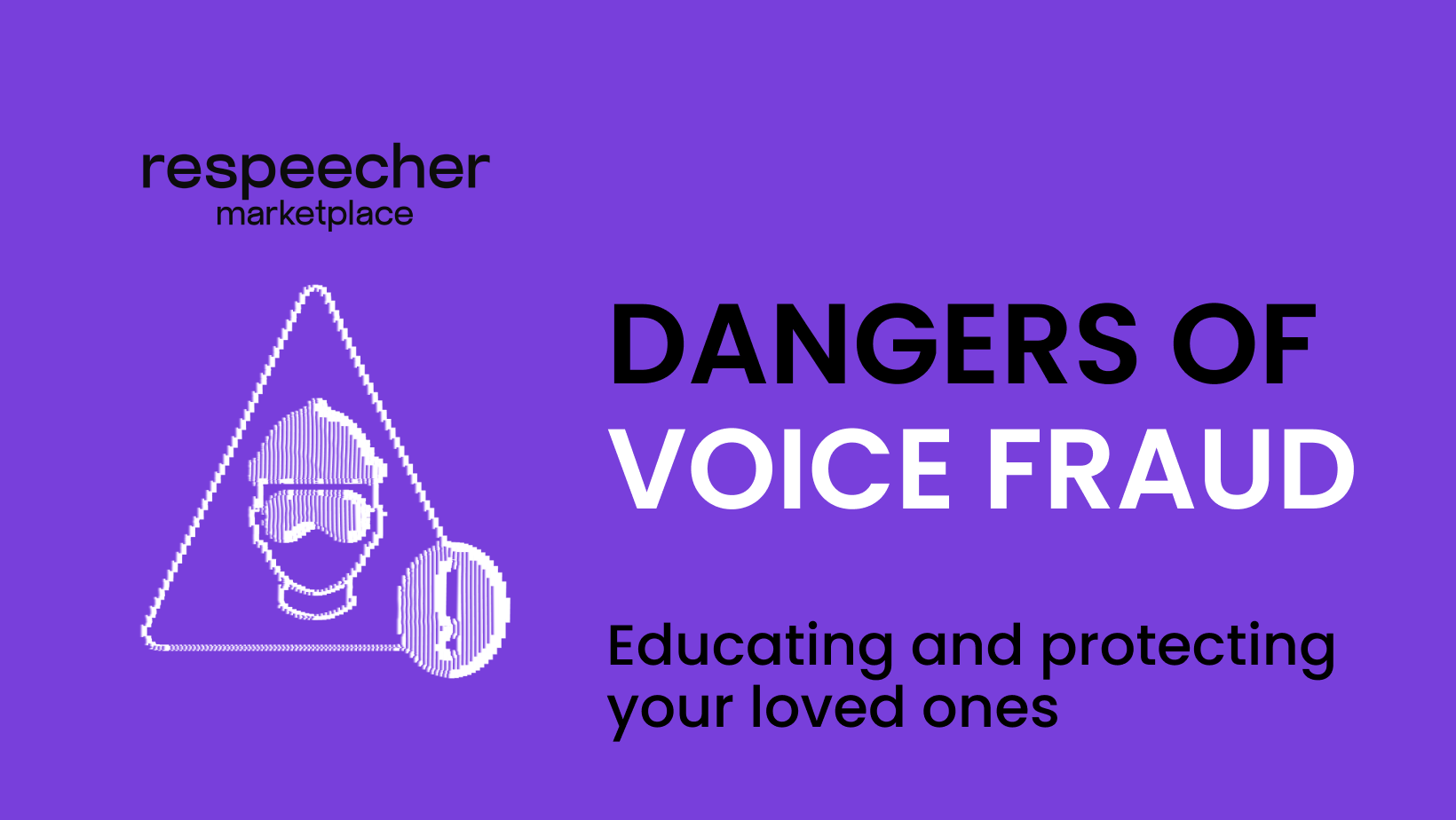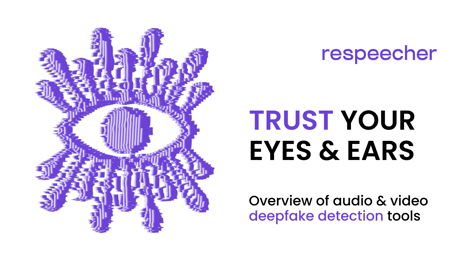Dangers of Voice Fraud: Educating and Protecting Your Loved Ones

Voice fraud, also known as voice phishing or vishing, is a deceptive practice where fraudsters use advanced voice technologies to impersonate trusted individuals or organizations. This fraud often involves convincing unsuspecting victims to divulge personal information, transfer money, or perform actions that compromise their security. The impact of voice fraud on society is significant, particularly on vulnerable groups such as older people and children.
These groups are often targeted due to their trusting nature and limited awareness of the sophisticated tactics used by scammers. Ethical AI is essential to ensure that technological advancements do not become tools for malicious activities.
Companies like Respeecher lead the charge, demonstrating a strong commitment to ethical voice AI services. By prioritizing the ethical implications of their technology, Respeecher aims to create a safer digital environment where individuals can enjoy the benefits of advanced voice solutions without falling prey to fraudsters.
Understanding Voice Fraud
Voice fraud has evolved with technology, resulting in sophisticated schemes exploiting human trust and technological vulnerabilities. Some of the latest and most common types include:
- Vishing (Voice Phishing): This scheme involves fraudsters making phone calls pretending to be from legitimate organizations, such as banks or government agencies, to extract sensitive information from victims.
- Synthetic Voice Phishing: Leveraging advanced AI technologies, scammers create synthetic voices that mimic those of trusted individuals, such as family members or colleagues, to deceive victims into providing personal information or money.
- Robocalls: Automated calls with pre-recorded messages designed to trick recipients into calling back a fraudulent number or following instructions that compromise their security.
- Caller ID Spoofing: Fraudsters manipulate caller ID information to make it appear that the call comes from a trusted source, increasing the likelihood that the victim will answer and comply with requests.
- Deepfake Audio: Using AI, scammers generate highly convincing audio recordings that imitate the voice of a known individual, often used in conjunction with other fraud techniques to enhance credibility.
Understanding the mechanisms behind AI voice scams is crucial for recognizing and preventing them. Here's how fraudsters typically operate:
- Research and Targeting: Scammers gather information about potential victims through social media, data breaches, or public records. This information helps them craft believable stories and scenarios.
- Impersonation: Using the collected information, fraudsters impersonate trusted individuals or organizations. They may use synthetic voices or caller ID spoofing to enhance their credibility.
- Psychological Manipulation: Scammers often employ psychological tactics to create a sense of urgency or fear. They may claim an emergency involving a loved one, a problem with the victim's bank account, or an opportunity requiring immediate action.
- Request for Action: The fraudster asks the victim to provide sensitive information (such as social security numbers, bank account details, or passwords), transfer money, or perform other actions that compromise their security.
- Exploitation: Once the victim complies, the fraudster uses the obtained information for financial gain, identity theft, or fraud.
Complete 2024 Guide on Synthetic Media

Preventive Measures for the Elderly
One of the most effective ways to protect older people from voice fraud is through educational programs and workshops. These initiatives aim to raise awareness and provide the knowledge necessary to recognize and respond to suspicious calls.
Local community centers, libraries, and senior centers can host workshops to educate older people on the various types of voice fraud. Many organizations also offer online courses and webinars that elderly individuals and their caregivers can access from home. These resources often include interactive elements, such as quizzes and videos, to reinforce learning.
Pamphlets, brochures, and posters distributed in places frequently visited by seniors can serve as constant reminders of the dangers of voice fraud and the steps to take if they suspect an AI scam. Also, creating peer support groups where seniors can share their experiences and learn from each other can foster a sense of community and collective vigilance against scams.
In addition to education, implementing secure communication practices can significantly reduce the risk of falling victim to voice fraud. Here are some essential practices for the elderly:
- Verify Caller Identities: Encourage seniors to independently verify the identity of callers claiming to represent organizations or individuals.
- Ignore Unsolicited Requests: Seniors should be advised to ignore unsolicited requests for personal information, especially if they are asked for over the phone.
- Use Caller ID: Teach seniors to use caller ID and be cautious of answering calls from unknown or suspicious numbers. They should also be aware that caller ID information can be spoofed.
- Report Suspicious Calls: Encourage seniors to report suspicious calls to family members, caregivers, or relevant authorities. Reporting these incidents can help track and combat fraudsters.
Safeguarding Children
Establishing clear and effective family safety protocols is essential in protecting children from voice fraud. These protocols should include:
- Secret Passwords: The child should know to end the call immediately if the caller cannot provide the correct password.
- Designated Safe Adults: This list can include parents, close relatives, or family friends. Teach children to call these designated adults if they receive suspicious calls or feel unsafe.
- Emergency Plans: Develop and regularly review family emergency plans that include what to do if a child receives a suspicious call. Practice these plans through role-playing exercises to ensure children know how to respond appropriately.
Teaching children to think critically about unexpected calls is crucial in helping them avoid becoming victims of voice fraud. Children should always be encouraged to question the authenticity of unexpected calls. They should be encouraged to ask the caller for specific information that only a trusted person would know and to be wary of callers who seem overly insistent or urgent.
For example, Respeecher and Highwire have partnered to teach children aged 9-14 about critical thinking in the digital age, encouraging them to question the authenticity of online content in cybersecurity training.
Also, educate children about common red flags in voice fraud, such as requests for personal information, threats, or promises that seem too good to be true. Help them understand that legitimate organizations or family members will not ask for sensitive information over the phone.
Technological Solutions
Voice biometrics is an advanced technology that analyzes unique vocal characteristics to verify a person's identity. This method can effectively authenticate legitimate callers and combat fraud with voice biometrics. It relies on distinct vocal traits such as pitch, tone, and speech patterns, which are difficult for fraudsters to replicate. These traits create a voiceprint, similar to a fingerprint, that can be used for identity verification.
By integrating biometric voice profiles into communication systems, organizations can ensure that only verified individuals can access sensitive information or services. This technology can significantly reduce the risk of voice fraud by making it challenging for impostors to mimic legitimate callers.
Several tools and services are designed to detect and prevent voice fraud with real-time testing, ensuring that suspicious activities are identified and addressed promptly. Notable among these is Pindrop Security, which offers comprehensive solutions for voice fraud detection. Pindrop technology analyzes calls in real time to detect anomalies and potential fraud indicators.
This includes evaluating the acoustic characteristics of the call, such as background noise and voice modulation, to identify signs of voice cloning or synthetic speech. The system assigns a risk score to each call based on various factors, including the caller's behavior, device characteristics, and geographical location. High-risk calls are flagged for further investigation or immediate action, helping to prevent AI fraud before it occurs.
Promoting Ethical AI Usage
Respeecher is at the forefront of ensuring the ethical use of AI voice cloning technologies. The company’s commitment to ethical practices is demonstrated through stringent policies and protocols prioritizing user consent and moderation. Respeecher requires explicit consent from individuals whose voices are being synthesized. This ensures that all voice cloning activities are authorized and transparent. By obtaining clear permission, Respeecher safeguards against unauthorized use and potential abuse of its technology.
To prevent misuse, Respeecher implements rigorous content moderation processes. This includes monitoring and reviewing the purposes for which their voice technology is being used, ensuring it aligns with ethical guidelines and does not facilitate harmful or deceptive activities. Respeecher also maintains high transparency in their operations, openly communicating their ethical policies and practices to clients and the public.
To help ensure the safe use of AI, Respeecher collaborates with companies like Pindrop and Reality Defender. Respeecher also offers AI voice solutions for Cybersecurity - the case of Tevora being just one of the examples - and offers API integrations with a high level of security.
Establishing and adhering to industry-wide ethical standards is crucial for developing and applying AI technologies. These standards help ensure that AI advancements benefit society while minimizing potential risks and harms. Important aspects of industry standards for AI ethics include:
- Comprehensive Guidelines
- Ethical Review Boards
- Regular Audits and Assessments
- Public Engagement and Education
- Global Collaboration
Conclusion
Voice fraud poses a significant cyber threat, particularly to vulnerable groups such as the elderly and children. However, by adopting educational, practical, and technological strategies, individuals can protect themselves and their loved ones. To combat voice fraud effectively, everyone must adopt these preventive measures and stay vigilant.
Educate yourself and your loved ones about the risks and tactics used by fraudsters. Implement secure communication practices and leverage technological solutions to enhance your cybersecurity protection.
Additionally, you can support the development and application of ethical AI technologies by advocating for transparent and accountable practices within the industry. Visit Respeecher Voice Marketplace to learn more about our ethical standards on voice cloning defense and API integration options.
FAQ
A vishing attack, or voice phishing, is a type of fraud where scammers use phone calls to trick victims into revealing personal information, such as bank details or social security numbers, by pretending to be a legitimate entity like a bank or government agency.
The main difference between phishing and vishing is the method of communication. Phishing typically involves deceptive emails or messages to obtain sensitive information, while phone vishing involves fraudulent calls.
AI voices are legal as long as they are used ethically and with consent. Unauthorized use of voice AI to impersonate someone or for malicious purposes can lead to legal consequences.
Yes, voice cloning can be detected using advanced detection tools that analyze vocal patterns and acoustic characteristics. Technologies like Pindrop Security and Reality Defender provide real-time detection of synthetic voices and potential fraud attempts.
The five stages of penetration testing are:
- Planning and Reconnaissance: Gathering information and setting objectives.
- Scanning: Identifying vulnerabilities through network and system scans.
- Gaining Access: Exploiting vulnerabilities to gain unauthorized access.
- Maintaining Access: Ensuring persistent access to compromised systems.
- Analysis and Reporting: Documenting findings and providing remediation recommendations.
Glossary
Penetration testing
A simulated cyberattack on a system to identify vulnerabilities that hackers could exploit.
Vishing
A type of fraud where scammers use phone calls to deceive victims into revealing personal information by posing as legitimate entities.
Phishing
Voice biometrics

- voice cloning
- speech synthesis
- Vishing
- voice phishing
- Respeecher Voice Marketplace
- AI Ethics
- voice ai
- Pindrop
- fraud prevention
- voice authentication
- social engineering penetration testing
- vishing attacks
- synthetic voice phishing
- Cybersecurity
- voice cloning defense
- cyber threats
- biometric voice profiles
- real-time testing
- voice cloning detection
- cybersecurity training
- what is vishing
- what is ai ethics
- combat fraud with voice biometrics
- Pindrop security
- AI voice scam
- phone phishing
- voice fraud
- AI fraud
- AI scam





